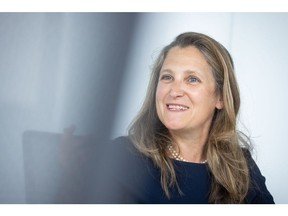Canadian Finance Minister Chrystia Freeland denied that there’s growing friction between her office and that of Prime Minister Justin Trudeau.

Article content
(Bloomberg) — Canadian Finance Minister Chrystia Freeland denied that there’s growing friction between her office and that of Prime Minister Justin Trudeau.
Asked if there has been greater tension between herself and Trudeau, or between their aides, the Canadian finance minister said: “From my perspective, not at all.”
Freeland’s future has been the subject of discussion within Canada since a report in The Globe and Mail on Thursday alleged that officials in Trudeau’s office believe Freeland has done a poor job of communicating the government’s economic message. The newspaper, citing anonymous sources, reported that officials had discussed the possibility of trying to get Mark Carney, the former governor of the Bank of Canada and the Bank of England, to take the finance minister’s role — with Freeland moving to a different cabinet post.
Advertisement 2
Article content
In an interview with Bloomberg News, Freeland said she fully supports Trudeau as prime minister and that it’s for him to answer questions about who serves in his cabinet.
“My perspective is clear and actually very simple, which is I really consider it a privilege every single day that I serve as finance minister and deputy prime minister,” she said.
Freeland said she has spoken with the prime minister twice this week, including on Friday morning. A government official, speaking on condition they weren’t named, said Trudeau and Freeland discussed planning for the fall economic statement, a policy document that’s typically delivered in October or November.
Canada’s economic growth has slowed this year and unemployment is rising, but on a number of measures its economy is holding up well. The federal budget deficit is below 2% of gross domestic product, inflation has eased to less than 3%, and last month the Bank of Canada became the first Group of Seven central bank to cut interest rates in the post-pandemic period. Economists surveyed by Bloomberg are forecasting a soft landing, not a recession, with growth picking up next year.
Article content
Advertisement 3
Article content
Yet Trudeau’s government remains stuck in a deep hole in public opinion surveys. For most of the past year, his governing Liberal Party has consistently trailed the rival Conservative Party by a double-digit margin, a gap that has stayed relatively constant despite a series of budget measures meant to address housing shortages and affordability concerns. A recent poll by Nanos Research for Bloomberg News found that about 30% of Canadians believe Conservative chief Pierre Poilievre is the best party leader to manage economic growth, compared with 19% for Trudeau.
Speaking to reporters on Thursday in Washington, Trudeau praised Freeland’s record but did not explicitly state whether he wanted her to remain finance minister. But a spokesperson for Trudeau said: “The prime minister has full confidence in Chrystia Freeland as deputy prime minister and finance minister.”
Freeland said she spoke this week with UK Chancellor Rachel Reeves and US Treasury Secretary Janet Yellen, and they discussed how they were anticipating a finance ministers’ gathering this fall during the Group of 20 summit in Brazil. “There’ll be three women around the table, and all three of us are looking forward to that,” she said.
Advertisement 4
Article content
‘Time Is Our Friend’
Trudeau and Freeland have a short runway to turn around public opinion: the next federal election is due in the fall of 2025.
The government has announced major spending plans in a number of areas, including on housing construction, in response to public concerns about the cost of living.
“I think time is our friend,” Freeland said.
“We have the investments in place that are starting to kick in. I think when you look at the macro cycle, getting to actually having the soft landing is really important for everyone.”
Political watchers in Canada have speculated for years about whether Carney will run for political office, especially after he left the Bank of England in 2020, returned to his home country and joined the Liberal Party. He currently serves in several corporate and philanthropic roles, including as chair of Brookfield Asset Management and chair of Bloomberg Inc.
Trudeau told reporters this week he has been talking to Carney for years about getting him to enter politics, and said the ex-central banker would be “an outstanding addition at a time when Canadians need good people to step up in politics.”
Freeland said she talks to Carney “pretty often,” pointing out they both come from northern Alberta and have known each other for a long time. Asked if she wanted Carney to join the government, Freeland said, “it’s very positive for us that he has come out as a Liberal.”
“I think all of us are very supportive of anything he can offer to our party, to our government, to our country,” she said.
—With assistance from Erik Hertzberg and Thomas Seal.
Article content

